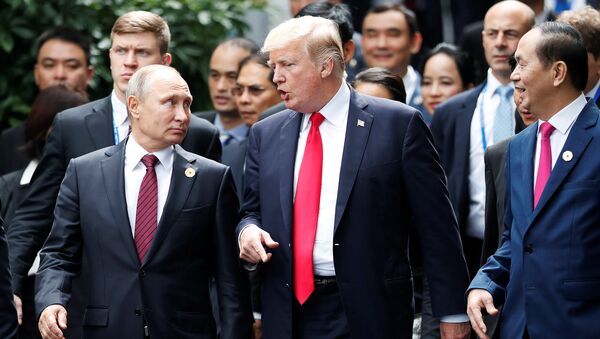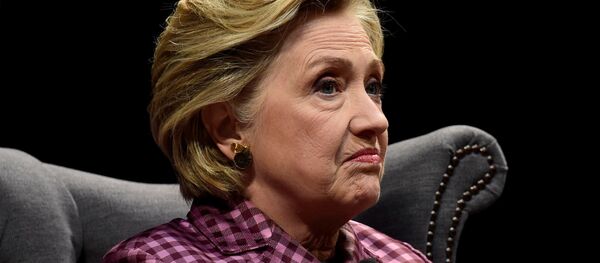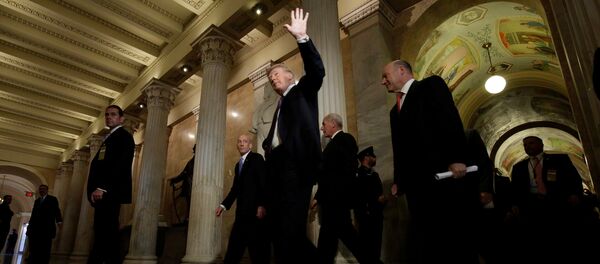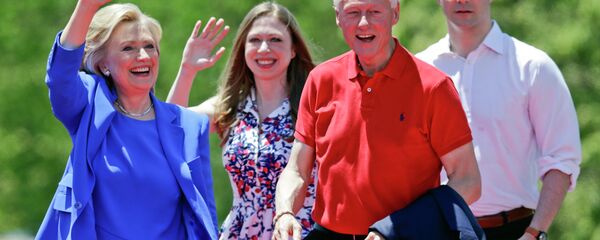British journalist Luke Harding's new book "Collusion: Secret Meetings, Dirty Money, and How Russia Helped Donald Trump Win" is nothing but part of a carefully planned PR campaign aimed against Moscow, Albrecht Muller, the former deputy of the Bundestag and editor of the online media outlet Nach Denk Seiten told Sputnik Germany.
Harding's opus has once again proven that "such actions as the ongoing anti-Russian campaign, which is also targeting the US president who was elected a year ago, are planned to the smallest detail," Muller noted.
The former German parliamentarian said that one can find "all methods of manipulation" in the Briton's book; he referred to "the repetition of one and the same allegations", "obvious exaggerations, such as Watergate" and baseless accusations of "treason."
According to the reporter's story, in December 2016 he met former MI6 officer Christopher Steele in a London pub to discuss President-elect Donald Trump's Russia connections. Later, Steele's controversial "Trump dossier" caught the headlines while presenting no evidence to back the narrative.
Harding goes farther than Steele, who alleged that Trump established ties with Russian secret services in the 2010s: the author writes that "Donald Trump appears to have attracted the attention of Soviet intelligence" as early as in the 1980s.
However, the assumption does not have any solid ground: "How that happened, and where that relationship began, is an answer hidden somewhere in the KGB's secret archives," Harding writes, "Assuming, that is, that the documents still exist."
When asked by Sputnik why he called Russia "a US enemy," Harding cited his four years of experience in Moscow, insisting that since 2007 Russia's media outlets have promoted an anti-Western narrative like the KGB — the Soviet Committee for State Security — did in the Cold War era.
At the same time, the author refused to answer Sputnik's question about internal manipulations in the US elections, which were exposed by American investigative reporter Greg Palast in 2016. Much in the same vein, he reacted to the remark about the assistance provided by the US to former Russian President Boris Yeltsin's for his reelection campaign in 1996.
"He is lying," Muller said commenting on the British journalist's statement that Russia has long regarded the West as the "enemy." The hostility between Russia and Western countries have emerged only in the recent years and it's necessary to pay attention to how the US and Europe contributed to this trend, the former German parliamentarian emphasized.
For his part, German political scientists Erhard Crome dubbed Harding's book "a furious babbling of a journalist who wants to take revenge for being thrown out of Moscow."
"At the moment the bullying [campaign] kicked off by globalist interventionists, especially the Democratic party, the Clintons and Barack Obama's supporters, has become an integral part of US policy," Crome told Sputnik. "They do not want to move on after their defeat in the [2016 presidential] elections, [they want] to prevent the change in the [US] foreign policy by all means possible."
According to Crome, "the longer Trump is in power, the more his opponents' anger grows; and the fewer the facts of Trump's potential ties with Russia are, the louder the screams are."
Gabriele Krone-Schmalz, German broadcast journalist and author of "Ice Age: How Russia is Demonized and Why It is So Dangerous" echoes Crome, saying that the Democrats and supporters of former presidential nominee Hillary Clinton have jumped at the opportunity to blame Donald Trump and Moscow for their defeat in the 2016 elections.
"Sure, if anything goes wrong somewhere, the Russians are to blame, also for the fact that America has to endure Trump," she said in an interview with Sputnik.
According to Krone-Schmalz, the trend is by no means laughable: "One has to get anxious because the world is not that simple. Wrong assumptions lead to wrong decisions. In business, wrong decisions cost money, and in politics — the price sometimes is peace."
It appears that by being full of controversial assumptions, Harding's book may facilitate a revival of the paranoia and infamous practices exercised by Joseph McCarthy in the 1950s.




